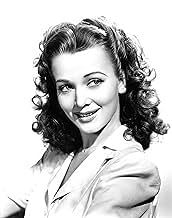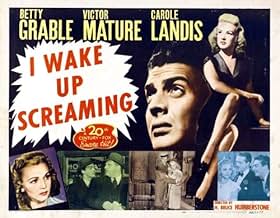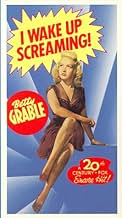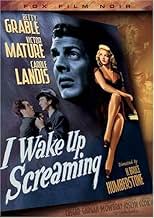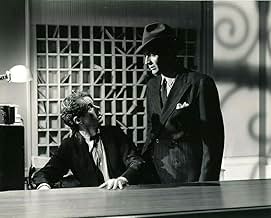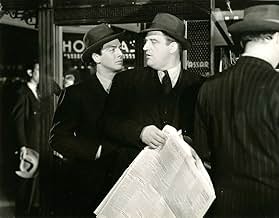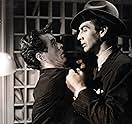NOTE IMDb
7,2/10
5,7 k
MA NOTE
Ajouter une intrigue dans votre langueWhy is Inspector Ed Cornell trying to railroad Frankie Christopher for the murder of model Vicky Lynn?Why is Inspector Ed Cornell trying to railroad Frankie Christopher for the murder of model Vicky Lynn?Why is Inspector Ed Cornell trying to railroad Frankie Christopher for the murder of model Vicky Lynn?
- Réalisation
- Scénario
- Casting principal
- Récompenses
- 2 victoires au total
May Beatty
- Lady Handel
- (as Mae Beatty)
Brooks Benedict
- Nightclub Patron
- (non crédité)
Edward Biby
- Nightclub Patron
- (non crédité)
Stanley Blystone
- Police Detective
- (non crédité)
Avis à la une
A pretty waitress is given a shot at the big time by a handsome sports impresario. She grabs her chance with alacrity, but Fate has plotted a different course for her ...
Bruce Humberstone directs this attractive early noir with a strong sense of visual style. His Director of Photography, Edward Cronjager, works wonders with elongated shadows and labyrinths of lattice.
Victor Mature looks good as Frankie Christopher, the romantic lead. Always a fairly limited actor, he never the less captures his character's ambivalence sufficiently well for the viewer to be kept wondering about him until the final reel. But for all Mature's efforts, Frankie remains a lightweight. He spends more time onscreen than anyone else, but remains in the viewer's memory less successfully than the other three leads.
After almost a decade in films, Betty Grable was 25 years old in 1941 and already an established star when she took on the role of Jill Lynne. Her character has psychological depth, and Grable does justice to the part. Jill is the slightly staid older sister of Vicky the glamour girl. While Vicky gives free rein to her every whim, Jill suppresses her id, but her yearnings are simmering just below the surface.
Of course, those legendary Grable legs have to be put on display, and we get three glimpses of Hollywood's most-insured thighs - first when the two sisters flounce around in robes, discussing the letter, then when Jill accompanies Frankie to the Lido Plunge, and finally when she is tottering up firescapes and over rooftops in her high heels.
Inspector Ed Cornell is a figure of stature, apparently a good guy, but one who fills the viewer with a sense of uneasy foreboding. Laird Cregar captures brilliantly the bleakness and creepiness of Cornell, the cop who starts the movie as a silent shadow, but who grows inexorably to dominate the proceedings. The moment when Jill meets Cornell for the first time is a very dramatic one, just as Vicky's first encounter with the eerie detective was disturbing. Robin Ray (Alan Mowbray) breaks down under interrogation, and Cornell's stillness as the suspect sobs is rather unsettling. "You're not a cop looking for a murderer," Cornell is told, and we become increasingly aware that this repressed man is conducting some kind of unhealthy personal crusade. It is only at the very end of the film that Cornell displays any emotion, and then the floodgates open.
Carole Landis, the ill-starred actress who plays Vicky Lynne, deserves a special mention. Like her character, whose fictional tragedy she paralleled in her own life, Landis was a victim of her own beauty. A tough but brittle radiance, total self-absorption and an impatience with the trappings of success ("I've got about as much privacy as a lingerie mannequin!") are Vicky's salient attributes, but could be said to apply to Landis herself. She gives a confident performance and sings beautifully. Like Vicky, she shot to instant fame but never found love, and died in her 20's. Thus does Life imitate Art.
The film contains some errors and improbabilities, but these do not seriously detract from the viewer's enjoyment. Cornell gathers evidence (such as discarded cigarette butts) with blatant disregard for preservation and continuity. That Harry should pack Jill's things, ready for her to move out, is just plain weird. The Assistant DA (played by Morris Ankrum) rides Cornell far too hard, given the detective's peerless reputation - and would the lawyer have direct operational command over a detective anyway? Frankie is allowed to compound felonies, and threaten cops, with impunity. Unbelievably, the police grant him the freedom to crack the case, even though he is the main suspect.
Music is used effectively throughout. "Somewhere Over The Rainbow" (the hit from the recent 'Wizard Of Oz') is Frankie and Jill's love theme. Vicky's signature tune is a wonderfully decadent jazz melody, brassily scored. Plot points are nicely underlined by discords in the incidental music, and during Cornell's final speech, Vicky's theme is reprised with great poignance and beauty on a muted trumpet.
We do not normally associate film noir with humour, but this one uses jokes well, both to punctuate the plot and to add a little light to the shade. Watch for gentle little gags involving latch keys, a Tootsie Roll, the girl at the Lido Plunge and a fold-away bed.
"You've got a heart made out of rock candy," Vicky is told, and in life the hard young woman is an unsympathetic character. Death transforms her, and she haunts the remainder of the film like a sort of ghost, her photograph adorning walls and bedside tables, more appealing in reverie than she ever was in the flesh. There is no help for it, Vicky is gone for ever. The question is whether those who loved her can continue to live without hope. "It can be done," intones the nihilistic Cornell.
Just for the record, though two characters are startled out of sleep by bedroom intruders, nobody in "I Wake Up Screaming" wakes up screaming.
Bruce Humberstone directs this attractive early noir with a strong sense of visual style. His Director of Photography, Edward Cronjager, works wonders with elongated shadows and labyrinths of lattice.
Victor Mature looks good as Frankie Christopher, the romantic lead. Always a fairly limited actor, he never the less captures his character's ambivalence sufficiently well for the viewer to be kept wondering about him until the final reel. But for all Mature's efforts, Frankie remains a lightweight. He spends more time onscreen than anyone else, but remains in the viewer's memory less successfully than the other three leads.
After almost a decade in films, Betty Grable was 25 years old in 1941 and already an established star when she took on the role of Jill Lynne. Her character has psychological depth, and Grable does justice to the part. Jill is the slightly staid older sister of Vicky the glamour girl. While Vicky gives free rein to her every whim, Jill suppresses her id, but her yearnings are simmering just below the surface.
Of course, those legendary Grable legs have to be put on display, and we get three glimpses of Hollywood's most-insured thighs - first when the two sisters flounce around in robes, discussing the letter, then when Jill accompanies Frankie to the Lido Plunge, and finally when she is tottering up firescapes and over rooftops in her high heels.
Inspector Ed Cornell is a figure of stature, apparently a good guy, but one who fills the viewer with a sense of uneasy foreboding. Laird Cregar captures brilliantly the bleakness and creepiness of Cornell, the cop who starts the movie as a silent shadow, but who grows inexorably to dominate the proceedings. The moment when Jill meets Cornell for the first time is a very dramatic one, just as Vicky's first encounter with the eerie detective was disturbing. Robin Ray (Alan Mowbray) breaks down under interrogation, and Cornell's stillness as the suspect sobs is rather unsettling. "You're not a cop looking for a murderer," Cornell is told, and we become increasingly aware that this repressed man is conducting some kind of unhealthy personal crusade. It is only at the very end of the film that Cornell displays any emotion, and then the floodgates open.
Carole Landis, the ill-starred actress who plays Vicky Lynne, deserves a special mention. Like her character, whose fictional tragedy she paralleled in her own life, Landis was a victim of her own beauty. A tough but brittle radiance, total self-absorption and an impatience with the trappings of success ("I've got about as much privacy as a lingerie mannequin!") are Vicky's salient attributes, but could be said to apply to Landis herself. She gives a confident performance and sings beautifully. Like Vicky, she shot to instant fame but never found love, and died in her 20's. Thus does Life imitate Art.
The film contains some errors and improbabilities, but these do not seriously detract from the viewer's enjoyment. Cornell gathers evidence (such as discarded cigarette butts) with blatant disregard for preservation and continuity. That Harry should pack Jill's things, ready for her to move out, is just plain weird. The Assistant DA (played by Morris Ankrum) rides Cornell far too hard, given the detective's peerless reputation - and would the lawyer have direct operational command over a detective anyway? Frankie is allowed to compound felonies, and threaten cops, with impunity. Unbelievably, the police grant him the freedom to crack the case, even though he is the main suspect.
Music is used effectively throughout. "Somewhere Over The Rainbow" (the hit from the recent 'Wizard Of Oz') is Frankie and Jill's love theme. Vicky's signature tune is a wonderfully decadent jazz melody, brassily scored. Plot points are nicely underlined by discords in the incidental music, and during Cornell's final speech, Vicky's theme is reprised with great poignance and beauty on a muted trumpet.
We do not normally associate film noir with humour, but this one uses jokes well, both to punctuate the plot and to add a little light to the shade. Watch for gentle little gags involving latch keys, a Tootsie Roll, the girl at the Lido Plunge and a fold-away bed.
"You've got a heart made out of rock candy," Vicky is told, and in life the hard young woman is an unsympathetic character. Death transforms her, and she haunts the remainder of the film like a sort of ghost, her photograph adorning walls and bedside tables, more appealing in reverie than she ever was in the flesh. There is no help for it, Vicky is gone for ever. The question is whether those who loved her can continue to live without hope. "It can be done," intones the nihilistic Cornell.
Just for the record, though two characters are startled out of sleep by bedroom intruders, nobody in "I Wake Up Screaming" wakes up screaming.
Evocatively directed by Bruce Humberstone, this absorbing early film noir contains a surface sheen, polished elegance, and haunting ambiguity that anticipate similar noirs by Otto Preminger. Its cast of unusual actors and all-time greats is uniformly excellent. Betty Grable is quite revealing and capable of expressing a genuine human emotion in the rare dramatic role of Jill Lynn, the sister of the slain victim Vicky (Carole Landis). Victor Mature looks suitable for his part. Laird Cregar (who would later play the Devil in Lubitsch's "Heaven Can Wait") may be the most memorable character in the film; he is truly scary as the corrupt detective investigating the murder case. Director Humberstone's way of handling the two disjointed flashback structures in the beginning, narrated by Mature & Grable in their two separate rooms is quite intriguing and masterful. The film has a way of surprising us with its captivating twists and revelations, never failing to arouse the viewer's imagination. One of the most enjoyable noirs of the 40s.
There's a lot to like about this Film Noir: excellent use of shadows (some spectacular patterns), Victor Mature's best acting role, Carole Landis' (who's both a better actress & prettier than Betty Grable) juicy part, Laird Cregar in one of the best scary roles of his too short career, & a strong plot. For cheesecake fans: yes, you do get to see Betty's great legs in a swimming pool scene that seems to have been incorporated into this film for just that purpose. For beefcake fans: yes, you do get to see Victor's chest in the same swimming pool scene. So everyone should have something to be happy about. There's lots of suspects here (five solid ones) to choose from, & I got it wrong, so the film gets an extra point for that. I rate it 9/10.
Being a fan of old movies, I must say that Cregar's performance in this film interested me a great deal. Having only been in his mid 20's at production, he is able to come off as a man who has indeed been on the force for some years. I've enjoyed his work in other movies, and wonder while watching his work what might have been had he lived beyond the young age of 28.
9dtb
Victor Mature, Betty Grable, and Carole Landis had all been in movies together (mostly musicals) in various combinations, but I WAKE UP SCREAMING (IWUS) was the first film noir all three of them starred in. Maybe that's why IWUS still feels so fresh; everyone in it and everything about it brims with verve and brio, as if all concerned were eager to start filming. Though the movie begins in a NYC police interrogation room (an effective change from the novel's Hollywood setting), IWUS's plot starts more like PYGMALION/MY FAIR LADY than pulse-pounding crime fiction like the Steve Fisher novel the movie's based on. Flashbacks show how promoter Frankie Christopher (Victor Mature), newspaper columnist Larry Evans (Allyn Joslyn), and veteran actor Robin Ray (Alan Mowbray) grab a bite at a Times Square eatery and end up betting they can turn their tart-tongued but beautiful waitress, Vicky Lynn (the incandescent Carole Landis), from a hash slinger to a headliner by getting her name in the papers and her face plastered all over town. It works *too* well: dazzled by her own success, Vicky snares a Hollywood screen test and contract right under her shocked benefactors' noses, only to be murdered on the eve of her Tinseltown departure. Jill finds Frankie standing over Vicky's body, swearing he found her that way. Hotshot Police Inspector Ed Cornell (Laird Cregar) insists Frankie's lying. 15-year veteran Cornell has never been wrong, and he's obsessed with making an example out of hapless Frankie. But does justice alone explain Cornell's zeal, or does he have a hidden agenda? The cat and mouse game is afoot between Frankie, determined to prove his innocence, and Cornell, a smoothly sinister behemoth of a man, ready, willing, and able to go to any lengths to railroad Frankie. Undeterred by the lack of a search warrant, Cornell even sneaks into Frankie's bedroom to watch him while he sleeps ("Someday you're gonna talk in your sleep, and when that day comes, I wanna be around."), doing his damndest to wear Frankie down with smilingly delivered threats and manipulation. With wily Cornell's festering resentment of Frankie, you can't tell what he'll pull next. A formidable, menacing presence, Cregar rocks in the role. His silky voice and charming smile somehow make him even scarier; no wonder IWUS put him on the map. Victor Mature's Frankie is a great match for Cregar's Cornell, with his outer charm and inner toughness. Always an appealing presence, Mature was a better actor than he got credit for, making it look easy. He was hot, too; no wonder Cornell sneeringly calls Frankie "Handsome Harry!" :-) Elisha Cook Jr. is fine as Harry Williams, the oddball switchboard operator and original suspect. (Fun Fact on film historian Eddie Muller's commentary track: Cook filmed his role as THE MALTESE FALCON's Wilmer at the same time he filmed IWUS.)
Things heat up as Jill and Frankie acknowledge what sharp Vicky had already realized: they're in love and eager to protect each other. It's cute and typical of the era to see Jill get starry-eyed when Frankie wants to marry her. It's even cuter when Frankie reveals his original surname as Jill dreamily sighs, "Mrs. Botticelli." Vicky's whirlwind trajectory from waitress to glamour girl to corpse plunges Jill into a world of murder, terror, and obsession, propelling her to flee with the man she loves, dogged by Cornell at every turn. When the plucky Grable's wholesome sexiness meets Mature's playful yet virile allure, it's Chemistry City! Dwight Taylor's screenplay tightens Fisher's sprawling novel almost to the point of claustrophobia (in a good way), with sharp, witty dialogue and comic relief balancing the nerve-racking tension. Taylor's dialogue is snappy, suspenseful, and poignant in all the right places. Loved that "key" exchange early on! Edward Cronjager's lush, expressionistic black-and-white photography is a thing of shadowy beauty, used especially well in Cregar's early scenes as combinations of heavy shadows and bright interrogation lights hide him from view.
Even with studio sets, IWUS evokes early 1940s NYC, even the rooftops. When Frankie shows Jill his old East Side neighborhood, it's fun as both a getting-to-know-you scene and a mini-travelogue of the non-touristy places where native New Yorkers go. This continues when the lovers become fugitives and Frankie shows Jill where to hide in the big city, including the library and a 24-hour grindhouse. Even the swimming pool scene has that spirit; sure, it's there primarily to show off sex symbols Mature and Grable in their swimsuits, but it reminded me of the city's neighborhood pools at their best. One ironic-in-retrospect bit, considering IWUS came out before the U.S. entered World War 2: incensed upon spotting Frankie and Jill dancing so soon after Vicky's murder, Larry calls in a blind item about them, snapping, "Scrap the stuff about the Japanese spy with the Kodak and run this!" Apparent nods to Fisher's pulp roots: 1.) Frankie takes Jill to The Pegasus Club, possibly a shout-out to the novel's narrator/writer hero, nicknamed "Pegasus," a.k.a. "Peg." 2.) During a Cornell/Frankie confrontation, a newsstand features Black Mask Magazine. (This scene gets my vote for cleverest use of a Tootsie Roll.) Finally, according to Muller's commentary, Cornell was named after Fisher's pal and fellow pulpster Cornell Woolrich.
Nice, quirky use of music, too, particularly "Over the Rainbow." Fans of vintage movie music will notice that the opening credits music is the same theme, Alfred Newman's "Manhattan Street Scene," also used in THE DARK CORNER. When Jill brings Frankie home to show him an incriminating letter, listen carefully: in the background, "Over the Rainbow" and "Manhattan Street Scene" cross-pollinate into a sinister new theme, courtesy of music arranger Cyril Mockridge. Ironically, although Mature and Joslyn each have scenes where they awaken with a start, nobody in I WAKE UP SCREAMING ever actually wakes up screaming! How could you wake up to find a huge cop staring at you and *not* scream? :-)
Things heat up as Jill and Frankie acknowledge what sharp Vicky had already realized: they're in love and eager to protect each other. It's cute and typical of the era to see Jill get starry-eyed when Frankie wants to marry her. It's even cuter when Frankie reveals his original surname as Jill dreamily sighs, "Mrs. Botticelli." Vicky's whirlwind trajectory from waitress to glamour girl to corpse plunges Jill into a world of murder, terror, and obsession, propelling her to flee with the man she loves, dogged by Cornell at every turn. When the plucky Grable's wholesome sexiness meets Mature's playful yet virile allure, it's Chemistry City! Dwight Taylor's screenplay tightens Fisher's sprawling novel almost to the point of claustrophobia (in a good way), with sharp, witty dialogue and comic relief balancing the nerve-racking tension. Taylor's dialogue is snappy, suspenseful, and poignant in all the right places. Loved that "key" exchange early on! Edward Cronjager's lush, expressionistic black-and-white photography is a thing of shadowy beauty, used especially well in Cregar's early scenes as combinations of heavy shadows and bright interrogation lights hide him from view.
Even with studio sets, IWUS evokes early 1940s NYC, even the rooftops. When Frankie shows Jill his old East Side neighborhood, it's fun as both a getting-to-know-you scene and a mini-travelogue of the non-touristy places where native New Yorkers go. This continues when the lovers become fugitives and Frankie shows Jill where to hide in the big city, including the library and a 24-hour grindhouse. Even the swimming pool scene has that spirit; sure, it's there primarily to show off sex symbols Mature and Grable in their swimsuits, but it reminded me of the city's neighborhood pools at their best. One ironic-in-retrospect bit, considering IWUS came out before the U.S. entered World War 2: incensed upon spotting Frankie and Jill dancing so soon after Vicky's murder, Larry calls in a blind item about them, snapping, "Scrap the stuff about the Japanese spy with the Kodak and run this!" Apparent nods to Fisher's pulp roots: 1.) Frankie takes Jill to The Pegasus Club, possibly a shout-out to the novel's narrator/writer hero, nicknamed "Pegasus," a.k.a. "Peg." 2.) During a Cornell/Frankie confrontation, a newsstand features Black Mask Magazine. (This scene gets my vote for cleverest use of a Tootsie Roll.) Finally, according to Muller's commentary, Cornell was named after Fisher's pal and fellow pulpster Cornell Woolrich.
Nice, quirky use of music, too, particularly "Over the Rainbow." Fans of vintage movie music will notice that the opening credits music is the same theme, Alfred Newman's "Manhattan Street Scene," also used in THE DARK CORNER. When Jill brings Frankie home to show him an incriminating letter, listen carefully: in the background, "Over the Rainbow" and "Manhattan Street Scene" cross-pollinate into a sinister new theme, courtesy of music arranger Cyril Mockridge. Ironically, although Mature and Joslyn each have scenes where they awaken with a start, nobody in I WAKE UP SCREAMING ever actually wakes up screaming! How could you wake up to find a huge cop staring at you and *not* scream? :-)
Le saviez-vous
- AnecdotesThe writers used the name "Cornell" for the obsessive cop played by Laird Cregar, a tribute to noir writer Cornell Woolrich.
- GaffesJill's new address is apartment F, but when Cornell visits, the door is clearly marked 3B.
- Citations
Ed Cornell: I'll follow you into your grave. I'll write my name on your tombstone.
- Crédits fousOn BBC Two UK broadcasts, the 20th Century Fox logo does not appear at the beginning; instead there's an opening credit saying "Twentieth Century-Fox Presents".
- ConnexionsEdited into I Wake Up Screaming: Deleted Scene (2006)
- Bandes originalesStreet Scene
(uncredited)
Music by Alfred Newman
[Played over main titles, then heard as background music throughout the movie]
Meilleurs choix
Connectez-vous pour évaluer et suivre la liste de favoris afin de recevoir des recommandations personnalisées
- How long is I Wake Up Screaming?Alimenté par Alexa
Détails
- Date de sortie
- Pays d’origine
- Langue
- Aussi connu sous le nom de
- I Wake Up Screaming
- Lieux de tournage
- Nu Pike Amusement Park, Long Beach, Californie, États-Unis(swimming pool)
- Société de production
- Voir plus de crédits d'entreprise sur IMDbPro
Box-office
- Budget
- 462 000 $US (estimé)
- Durée
- 1h 22min(82 min)
- Couleur
- Rapport de forme
- 1.37 : 1
Contribuer à cette page
Suggérer une modification ou ajouter du contenu manquant


